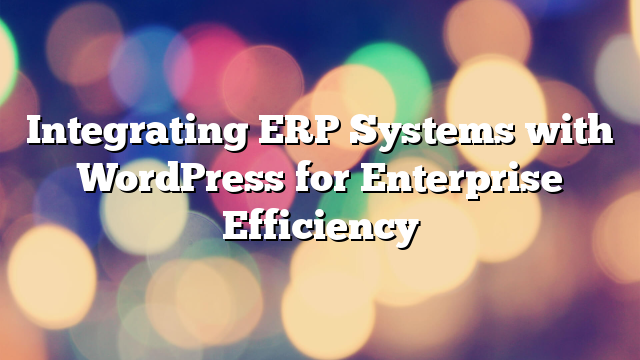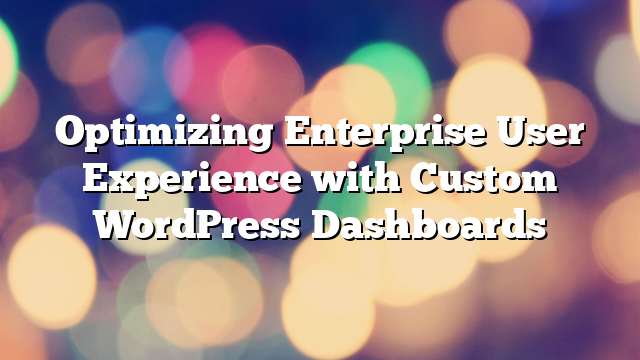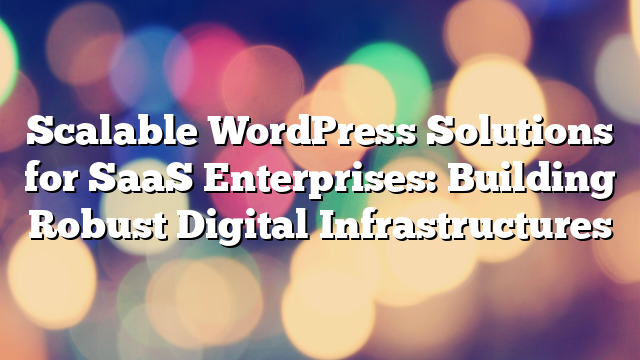The Role of PHP in Enterprise WordPress Development
08.11.2024

PHP remains the backbone of WordPress development, powering millions of websites across the globe. While the WordPress ecosystem has evolved with the rise of JavaScript frameworks and headless CMS, PHP continues to play a crucial role in ensuring that WordPress remains a robust, flexible, and scalable platform for enterprise-level applications. In this article, we’ll explore how PHP continues to shape enterprise WordPress development, its importance for performance, security, and customization, and why businesses still rely on it for building dynamic, scalable websites.
Why PHP is Integral to WordPress
WordPress is built primarily with PHP, a server-side scripting language that processes dynamic content and interacts with databases. PHP acts as a bridge between the database and the front-end of a WordPress site, generating HTML content dynamically and serving it to users. While the rise of modern JavaScript frameworks and static site generators has altered the development landscape, PHP is still at the heart of WordPress, powering everything from theme development to plugin functionality and complex customizations.
Key Benefits of PHP in Enterprise WordPress Development
1. Scalability and Flexibility
Enterprises need a web platform that can scale as their business grows. PHP is highly scalable and allows for dynamic content delivery, making it ideal for WordPress-based enterprise websites. Whether you’re managing a small blog or a large e-commerce site, PHP ensures that WordPress can handle varying levels of traffic and content volume efficiently. With proper optimization, PHP can support complex systems with high user interaction, making it well-suited for enterprise environments.
2. Customization and Extensibility
One of the reasons PHP is so integral to enterprise WordPress development is its ability to enable deep customization. WordPress plugins, themes, and custom post types are all built using PHP, which gives developers complete control over functionality. Enterprises often have specific requirements that off-the-shelf themes and plugins cannot fulfill, so PHP enables developers to build tailored solutions, such as custom workflows, advanced content management systems, or integrations with third-party tools and APIs.
Custom PHP code can also be used to extend the default WordPress dashboard, create new user roles, or customize the admin interface to meet enterprise needs. This level of flexibility ensures that WordPress can be molded to suit a business’s unique processes and objectives.
3. Speed and Performance Optimization
In an enterprise environment, performance is key. Slow websites result in high bounce rates and poor user engagement, which can harm business objectives. PHP plays an essential role in optimizing WordPress for speed by enabling caching, database optimizations, and efficient content delivery. By utilizing advanced PHP coding techniques such as query optimizations, asynchronous processing, and caching mechanisms (e.g., object caching, page caching), developers can significantly improve site speed and performance, even for content-heavy, high-traffic enterprise sites.
4. Strong Security Features
Security is a top concern for enterprises, and PHP helps safeguard WordPress sites through various built-in security measures. PHP handles tasks like data sanitization, input validation, and user authentication, which are crucial for preventing security vulnerabilities such as SQL injection, cross-site scripting (XSS), and cross-site request forgery (CSRF). With PHP, developers can implement additional security layers, such as encryption, two-factor authentication, and custom access controls, to protect sensitive enterprise data.
For enterprises with strict security policies, PHP’s capabilities to handle user authentication, sessions, and permissions make it an essential tool for safeguarding their websites and applications. Regular updates to the PHP language also ensure that WordPress sites stay protected against emerging security threats.
5. Community Support and Resources
PHP is one of the most widely used programming languages, and as such, it benefits from an extensive global community. Enterprise developers have access to a vast pool of resources, including tutorials, forums, libraries, and frameworks, to help troubleshoot issues and implement solutions quickly. The large PHP community also contributes to regular improvements, bug fixes, and security patches, making it easier for enterprises to maintain secure, optimized websites without spending too much time on troubleshooting.
PHP in WordPress Theme and Plugin Development
1. WordPress Theme Development
For enterprises looking to create a unique, branded digital presence, WordPress themes are built using PHP. While HTML, CSS, and JavaScript handle the presentation layer, PHP processes dynamic content, interacts with the database, and controls template rendering. With PHP, developers can create custom templates, layouts, and features that reflect the company’s branding and meet specific business needs. Enterprises often require custom themes to maintain consistency across various web pages, and PHP is key to ensuring these themes function as intended while remaining flexible for future updates.
2. Plugin Development
Plugins are essential for extending the functionality of a WordPress website, and PHP is used to create custom plugins that integrate with third-party systems, add complex features, and enhance site performance. Enterprise websites often require specialized plugins for things like CRM integration, marketing automation, or advanced e-commerce functionalities, and PHP allows developers to build these plugins from scratch or extend existing ones.
Whether an enterprise needs a custom analytics dashboard, a booking system, or an API integration, PHP is the programming language that powers plugin development, ensuring that the WordPress site meets specific business requirements and performs efficiently.
How PHP Helps with API Integration
Many enterprises rely on third-party systems and applications, from CRMs and ERPs to payment gateways and marketing platforms. PHP plays a crucial role in integrating these systems with WordPress by making API calls, handling responses, and ensuring seamless data transfer between systems. With PHP, developers can create custom API endpoints or use existing ones to connect WordPress with a wide range of external services.
For enterprises looking to automate workflows, manage large volumes of data, or synchronize systems in real time, PHP-powered API integrations are essential. These integrations allow WordPress to serve as the central hub for managing content, users, and business processes across a variety of platforms.
Best Practices for Optimizing PHP in Enterprise WordPress Development
1. Code Optimization
PHP code optimization is essential for improving website performance. Developers should focus on writing clean, efficient PHP code that reduces server load and accelerates page load times. Using PHP best practices like caching, object-oriented programming (OOP), and reducing unnecessary database queries can significantly enhance website performance, especially for high-traffic enterprise sites.
2. Regular Updates
PHP, like any programming language, evolves over time. Enterprise developers should stay up to date with the latest PHP versions and take advantage of new features, security improvements, and performance optimizations. Keeping PHP and WordPress updated ensures that enterprise websites remain secure, fast, and compatible with modern technologies.
3. Automated Testing
Testing is a critical part of any enterprise development process. With PHP, developers can use automated testing frameworks like PHPUnit to test individual components of the WordPress site and ensure that customizations work as expected. Automated testing helps catch bugs and issues early in the development cycle, reducing the risk of costly errors after deployment.
4. Leverage PHP Frameworks
For larger and more complex enterprise projects, developers can leverage PHP frameworks like Laravel, Symfony, or Zend Framework. These frameworks provide built-in tools and libraries that streamline development, improve security, and enhance scalability. Integrating these PHP frameworks with WordPress can help developers build more sophisticated enterprise solutions with less effort.
Conclusion
PHP remains an indispensable part of WordPress development, especially for enterprises that require scalable, flexible, and secure web solutions. From theme and plugin development to API integration and performance optimization, PHP empowers developers to create customized WordPress websites that meet the unique needs of businesses. As WordPress continues to evolve, PHP will remain a cornerstone of enterprise web development, offering the tools and functionality needed to create dynamic, high-performance websites for organizations of all sizes.
For expert guidance on optimizing PHP in WordPress for your enterprise, contact AllWebDev and take your WordPress site to the next level.



